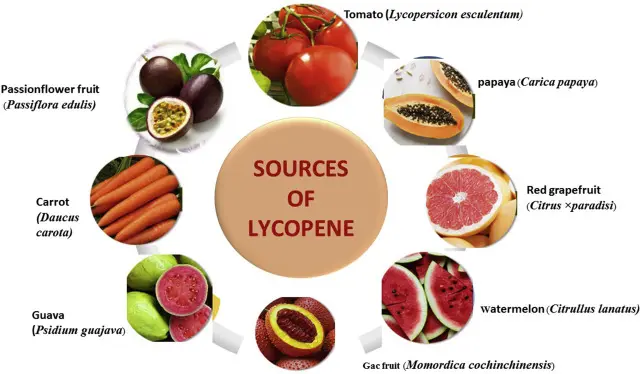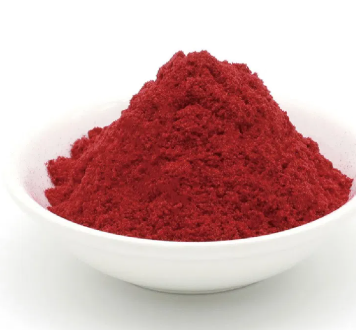What food is highest in lycopene?
What food is highest in lycopene ?
Tomatoes are generally regarded as one of the highest food sources of lycopene. However, the lycopene content can vary depending on the tomato variety, ripeness, and processing method.
Raw Tomatoes: Although raw tomatoes do contain lycopene, their bioavailability may be lower compared to processed forms.
Processed Tomatoes: Heat-treated tomatoes, such as sun-dried tomatoes, tomato paste, and tomato powder, typically contain higher levels of lycopene and have better bioavailability. This is because heat treatment helps break down the cellular structure of tomatoes, making lycopene easier for the body to absorb.
Sun-dried tomatoes and tomato powder can have extremely high lycopene content per serving.
Tomato paste also contains significant amounts of lycopene.
In addition to tomatoes, some other foods also contain high levels of lycopene, but usually not as high as tomatoes:
Pink Grapefruit: Contains a significant amount of lycopene, which gives it its pink color.
Watermelon: Another fruit that contains lycopene, especially in the red fleshy part.
Guava: This tropical fruit is also rich in lycopene.

Physiological function and efficacy
Cardiovascular Protection: Lycopene can reduce the levels of lipoproteins in the body and decrease blood viscosity, thereby aiding in cardiovascular protection and preventing cardiovascular diseases.
Beauty and Skin Care: Lycopene possesses antioxidant properties, which can delay skin aging, maintain skin health, and reduce the formation of wrinkles and age spots.
Vision Protection: As a type of carotenoid, lycopene plays a role in protecting vision.
UV Resistance: Lycopene can effectively resist UV radiation, reducing UV damage to the skin and serving as a sunscreen.
Alcohol Detoxification and Liver Protection: Taking lycopene can mitigate the damage caused by alcohol to the liver and alleviate adverse conditions such as dizziness and vomiting after intoxication.
Immunity Enhancement: Lycopene can activate immune cells, protect phagocytes from oxidative damage, promote the proliferation of T and B lymphocytes, stimulate the function of effector T cells, promote the production of certain interleukins, and inhibit the generation of inflammatory mediators, thereby enhancing the body's immunity.
Blood Lipid Regulation: Lycopene has a certain regulatory effect on blood lipids, contributing to maintaining stable blood lipid levels.
Edible suggestion
Since the human body cannot synthesize lycopene and can only obtain it through diet, consuming foods rich in lycopene is recommended to supplement this nutrient.
Lycopene is fat-soluble, so it is advisable to take it within half an hour after meals to improve its bioavailability.
To avoid direct contact between lycopene and iron or copper ions, stainless steel or glass containers should be used for cooking and storage instead of iron or copper utensils.
In addition to its known benefits such as protecting cardiovascular health, enhancing skin beauty, safeguarding vision, resisting UV radiation, alleviating alcohol intoxication and protecting the liver, boosting immunity, regulating blood lipids, as well as preventing and inhibiting cancer, lycopene also exhibits the following effects:
Promoting Digestion and Metabolism
Lycopene aids in regulating the body's metabolic functions. It not only promotes fat burning, which is beneficial for weight loss and maintaining a healthy weight, but also enhances digestive system health, facilitating food digestion and absorption, and reducing the occurrence of gastrointestinal diseases.
Anti-inflammatory Effects
Lycopene high quality possesses significant anti-inflammatory properties. It can inhibit the production of inflammatory factors and regulate inflammatory responses, making it potentially useful in the treatment of inflammatory diseases such as arthritis and enteritis.
Preventing Chronic Diseases
The antioxidant activity of lycopene helps protect DNA, lipids, and proteins from free radical attack, thereby reducing the risk of chronic diseases.
Comprehensive Health Benefits
As a nutrient, lycopene offers comprehensive health benefits, including enhancing body resistance and preventing infections and diseases. This is achieved by activating immune cells and promoting their proliferation and activation, thereby strengthening the body's immunity.
Dietary Considerations
Although lycopene offers various health benefits, excessive intake may pose potential risks. Therefore, it is recommended to consume lycopene in moderation based on individual health status and needs.
Lycopene powder is fat-soluble, so it is advisable to take it within half an hour after meals to improve its bioavailability.To avoid direct contact between lycopene and iron or copper ions, stainless steel or glass containers should be used for cooking and storage.
Conclusion

Lycopene is a natural pigment with various physiological functions and health benefits. By maintaining a reasonable diet and consuming lycopene in moderation, we can fully exploit its health benefits.
Contact sost biotech for buy lycopene bulk~
Contact us
Reference
https://m.youlai.cn/pjingbian/article/D2ACD1gkYET.html
https://baike.baidu.com/item/%E8%95%83%E7%BA%A2%E7%B4%A0/10767591
https://www.youlai.cn/yyk/article/898154.html
https://baike.baidu.com/item/%E7%95%AA%E8%8C%84%E7%BA%A2%E7%B4%A0%EF%BC%88%E5%90%88%E6%88%90%EF%BC%89/8434278
https://natalist.com/blogs/learn/lycopene-rich-foods

 Food Additives
Food Additives









